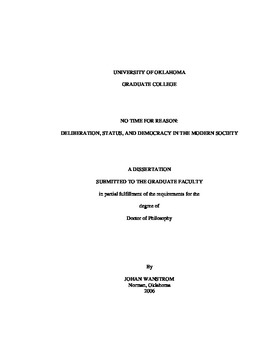| dc.contributor.advisor | Kramer, Eric M., | en_US |
| dc.contributor.author | Wanstrom, Johan. | en_US |
| dc.date.accessioned | 2013-08-16T12:20:06Z | |
| dc.date.available | 2013-08-16T12:20:06Z | |
| dc.date.issued | 2005 | en_US |
| dc.identifier.uri | https://hdl.handle.net/11244/1014 | |
| dc.description.abstract | Economic use of time (efficiency) and democracy are common features in many modern western societies. However, a strong egalitarian democracy requires equal participation in the social construction of meaning, reason and ultimately knowledge. That is, the intersubjectivity that is formed through communication and social interaction is the base of a democratic society. The pursuit of efficiency and status often stand in opposition to broad social interaction and human communication and therefore our ability to build common understanding and reason. That is, the temporal anxiety (the need for constant quantifiable gratification), that is strongly connected to the modern notion of individualism, negatively affects the creation of social bonds. The modern western society is therefore characterized by a quantifiable mass of disconnected individuals rather that a connected group of citizens. | en_US |
| dc.format.extent | vii, 91 leaves : | en_US |
| dc.subject | Social capital (Sociology) | en_US |
| dc.subject | Time Sociological aspects. | en_US |
| dc.subject | Political culture. | en_US |
| dc.subject | Speech Communication. | en_US |
| dc.subject | Social status. | en_US |
| dc.subject | Political Science, General. | en_US |
| dc.title | No time for reason: Deliberation, status, and democracy in the modern society. | en_US |
| dc.type | Thesis | en_US |
| dc.thesis.degree | Ph.D. | en_US |
| dc.thesis.degreeDiscipline | Department of Communication | en_US |
| dc.note | Adviser: Eric M. Kramer. | en_US |
| dc.note | Source: Dissertation Abstracts International, Volume: 67-02, Section: A, page: 0398. | en_US |
| ou.identifier | (UMI)AAI3208005 | en_US |
| ou.group | College of Arts and Sciences::Department of Communication | |
